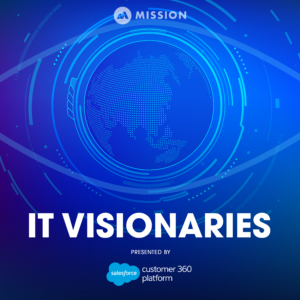Or listen in your favorite podcast app
Apple Podcasts / Google Podcasts / Spotify
There are countless ways that we can make an impact when it comes to addressing the climate crisis. Some of the steps we can take are small, but others have the potential to really make a dent in the goals set by climate leaders.
On this episode of IT Visionaries, we wanted to dive into some of those large-scale, hugely impactful projects, so we brought back Patrick Flynn, the Vice President of Sustainability at Salesforce, and welcomed Scott Tew, the Executive Director at the Center for Energy Efficiency & Sustainability at Trane Technologies.
One of the major areas both men are looking at to make a difference is in data centers, which, if retrofitted to become more efficient, would eliminate massive amounts of emissions from being pumped into the atmosphere. They explain more about that topic, as well as other ways individuals and businesses can get involved in the fight against climate change.
Key Takeaways
- It’s easy to get distracted by the “big shiny objects” when it comes to climate action, but the first and most important step to take is to ensure that you are operating as efficiently as possible/
- Technology has a huge role to play in creating more efficient systems, processes and buildings.
- There are countless ways to get involved, but companies that truly want to make an impact need to put forth real plans and take action right now.
For an in-depth look at this episode, continue below.
Mentions:
—
For years we have been hearing about the climate crisis and the need to take action in order to help save our planet. Recently, an increasing number of so-called ‘climate innovators’ have begun to take action in more public ways.
Among those innovators are Patrick Flynn, the Vice President of Sustainability at Salesforce, and Scott Tew, the Executive Director at the Center for Energy Efficiency & Sustainability at Trane Technologies. Patrick and Scoot stopped by IT Visionaries to discuss the methods they are using to create an impact in the fight against climate change.
“The climate crisis is the biggest, most important and most complex challenge humans have ever faced,” Flynn said. “And it has a degree of urgency to it, unlike anything we’ve ever seen. Winning slowly is the same as losing. And so any company, any individual for that matter, that aims to be a leader at this moment in time needs to deliver impact or aim to deliver impact at a scale that planet Earth will actually notice.”
One of the main areas of interest for both men is in the data centers that are the heart of so many corporations around the world. Buildings are responsible for 40% of the energy consumption in America, and data centers are responsible for a great deal of that due to the HVAC needed to cool servers. And so, from an operational standpoint, companies have been working inefficiently and emitting more carbon into the atmosphere due to the way their buildings and data centers are run. If companies simply start there, Tew explained that the impact could be substantial, and then those companies could move forward with more innovative and exciting climate actions.
“Number one is you have to make sure data centers are operating as efficiently as possible,” Tew said. “Before we move on to the other items, which I sometimes call the shiny objects, we have to first make sure it’s operating efficiently.”
When companies dive into the numbers associated with data center energy usage, the statistics are staggering. Fortunately, there are ways to cut back and to incentivize companies to do so.
“We’re able to now overlay things and almost set the artificial intelligence on top of all these other systems which then allows us to tweak the energy usage of a data center,” Tew said. “In real-time, we’re able to gain even a greater percentage of efficiency just by using some cloud-based data analytics.”
In addition to operating more efficiently in terms of buildings or data centers, both Tew and Flynn explained that there are many other ways to make an impact in this fight. There are countless initiatives and projects that individuals or organizations can get involved in, but three were top of mind for these innovators.
The first is The Gigaton Challenge, which Trane Technologies has implemented in order to reduce its customer carbon footprint by one gigaton of CO2 by 2030.
“A gigaton of carbon would be equal to the annual emissions of the UK, Italy and France combined,” Tew said. “We believe by doing that, and [showing] the rest of our industry how to do that, we can bring them along with us. And by doing so, we get an exponential impact in the marketplace and for the planet.”
Both Tew and Flynn also promote Project Drawdown, which is committed to helping the world reach its drawdown point as quickly as possible. What that means is “the point in the future when levels of greenhouse gases in the atmosphere stop climbing and start to steadily decline, thereby stopping catastrophic climate change.” On the Project Drawdown website, there are resources for everyone to use to find ways to help achieve the goals set, including creating more efficient buildings and planting trees, which is a project near and dear to Flynn.
Flynn and the team at Salesforce are committed to the One Trillion Trees Initiative, which has the potential to help remove huge amounts of carbon from the atmosphere.
“At this point in the drawdown, we’re talking about a few different levers that we have to pull to tackle this emissions challenge, and one is reducing the sources of emissions,” Flynn said. “The other is finding ways to draw carbon out of the atmosphere and enhancing those carbon sinks. And that’s where a project or initiative like the One Trillion Trees initiative comes into the picture. We know we can get started planting trees and conserving forests right away. We know the planet can handle that without disrupting the land needed for farming or for livelihoods or for dwellings. We can handle another trillion trees and that would provide about 200 gigatons of carbon sequestered out of the atmosphere effectively buying us a little more time and buying us a little more budget for all of the carbon-reducing activities that we know are really priority one and need to happen.”
Currently, the world is in an unprecedented time of multiple crises. The complexity of the challenges before us can be overwhelming. But as both Flynn and Tew said in their discussion, this is a time to think about and build resilience in all areas of life and business. Because it is only through relentless effort and constant innovation that we will be able to emerge from all of the challenges facing us today.
To hear the entire conversation or to find more episodes, including our sustainability series, check out IT Visionaries here.




